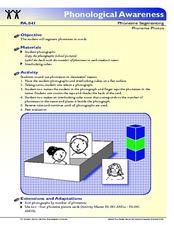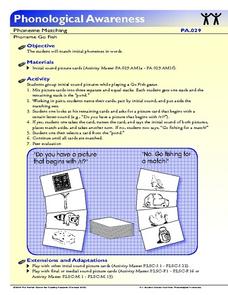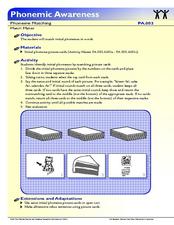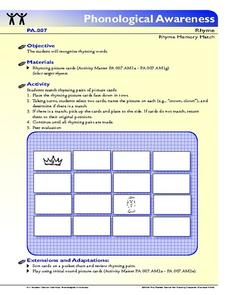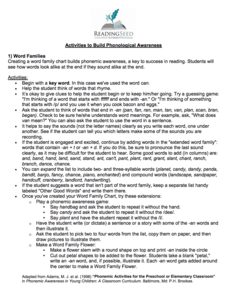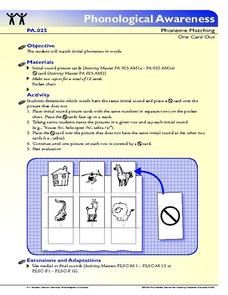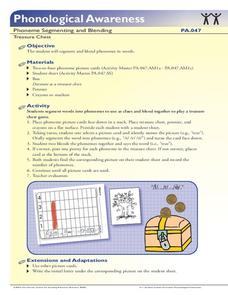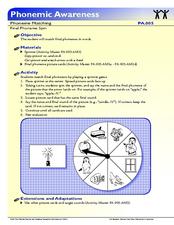Achieve3000
Discriminating Phonemes 2
Some sounds sound very similar! Help your class learn how to distinguish between various sounds by following the steps outlined in this plan. The plan includes a warm-up, a teacher-led portion, and details for guided and independent...
Florida Center for Reading Research
Phonological Awareness - Phoneme Segmenting and Blending, Treasure Chest
Working in pairs, scholars use picture cards to practice segmenting words into phonemes and blending phonemes into words. When a peer answers correctly they place a penny in a treasure chest. Incorrect responses make the card go back in...
Florida Center for Reading Research
Phonological Awareness: Phoneme Segmenting, The Sound Game
Pre-readers get a better understanding of phoneme segmenting and counting by playing a board game. They pick an image card from the stack, say the name of the object, break the word down into segments, then move their piece that number...
Florida Center for Reading Research
Phonological Awareness: Phoneme Segmenting, Phoneme Photos
This great activity incorporates counting, phoneme segmenting, and class photos. In pairs, learners take turns saying, counting, and checking the number of phoneme segments found in their classmates' names. They count the phonemes and...
Florida Center for Reading Research
Phonological Awareness: Phoneme Manipulating, What's Left?
Scholars subtract initial phonemes from given picture word cards to create new words. Feet becomes eat, and shelf becomes elf.
Florida Center for Reading Research
Phonological Awareness: Phoneme Isolating, Move and Tell
Build phonological awareness with this fun game focused on isolating and identifying medial phonemes. This game board contains an image on each square; when the child lands on a square, they must say the medial sound of the word they...
Florida Center for Reading Research
Phonological Awareness: Phoneme Matching, Phoneme Go Fish
Go fishing for initial sounds with this engaging phoneme game! Similar to the card game Go Fish, pairs use picture cards and try to match initial sounds. They set aside any pictures that are a match and ask their partner for specific...
Florida Center for Reading Research
Phonological Awareness: Phoneme Matching, Sound Train
Make a phonics train filled with matching initial phonemes. Early readers say the name of the objects on each of their cards, identify the initial letter sounds or phonemes, then paste them on a train. They make three trains, which means...
Florida Center for Reading Research
Phonological Awareness: Phoneme Matching, Sound Bags
Peers pair up to find, identify and match medial phonemes. Peer one pulls a card or object from a bag, names it, then says its medial sound.—peer two attempts to find a picture or object whose medial sound matches the partner.
Florida Center for Reading Research
Phonics: Letter-Sound Correspondence, Medial Phoneme Spin
A collaborative activity challenges young scholars to match medial graphemes and phonemes. Pairs take turns spinning the spinner, naming the letter, and saying its name. They choose from a stack of cards with the same medial sound.
Texas Center for Learning Disabilities
Second and Third Grade Explicit Phonics Intervention
Support all young learners on their journey to literacy with this five-lesson reading intervention unit. Following a clearly outlined format, each lesson first engages children in practicing their phonemic awareness and phonics skills...
Florida Center for Reading Research
Phonological Awareness: Phoneme Matching, Match Maker
Pre-readers identify and match initial phonemes. Scholars take turns choosing one card from each of the three stacks. They say the name of the image on the card, then keep whichever cards have a matching initial phoneme.
Florida Center for Reading Research
Phonological Awareness: Phoneme Matching, Final Phoneme Memory
Try to match the final sounds in this memory game! Learners place all 24 cards upside down and take turns flipping them to see if the final phonemes match. If they do, remove them; if not, put them back. Partners play until all cards...
Florida Center for Reading Research
Phonological Awareness: Rhyme, Rhyme Memory Match
Young scholars play a memory-matching game to practice recognizing rhyming words and sounds. With picture cards, they flip over two cards and say the pictures' names. If the pair make a rhyming match, the learner keeps the cards. The...
Florida Center for Reading Research
Phonological Awareness: Onset and Rime, Guessing Game
An activity challenges scholars to show what they know about onset and rime. Learners choose from a stack of picture cards and give onset and rhyming clues to see if their partners can guess the word they are holding.
Literacy Connects
Activities to Build Phonological Awareness
Begin your reading program each day with a mini lesson on phonological awareness using these engaging activities listed in the resource. Young ones will enjoy word families, clapping and counting syllables, identifying single sounds and...
Lerner Publishing
Teaching Vowel Combinations
Need some fun activities to augment your lessons on vowel patterns and phonemic awareness? Peruse a series of worksheets designed to help little ones with their early reading skills.
Florida Center for Reading Research
One Card Out
Remember the song, "One of These Things is not Like The Other?" Well, this phonemic awareness activity is just like that. The only difference is that learners work to determine which initial phoneme is not like the others on the chart....
Florida Center for Reading Research
Phonics: Letter-Sound Correspondence, Letter-Sound Pyramid
This fun game is a way to help your littlest learners build strong phonological awareness. Scholars equipped with letter triangles, a stack of picture cards, and counters choose a picture card, say the name of the image, and attempt to...
Florida Center for Reading Research
Sound Spin
Here is a phoneme segmenting game which incorporates drawing for your more artistic learners. Assemble the spinner using a brad and lay out the picture cards face up. Partners take turns spinning to get either two, three, four, or five....
Florida Center for Reading Research
Treasure Chest
Segmenting and blending phonemes helps budding readers understand words. Use this strategy in an engaging game where partners test each other's auditory processing using familiar words. Using picture cards and a chart (included),...
Florida Center for Reading Research
Final Phoneme Spin
Segmenting words into different phonemes helps kids on the road to reading and writing. Have some fun with this spinner game which includes all the print-outs you will need. Simply assemble the spinner using a brad and lay out the...
Florida Center for Reading Research
Phonological Awareness: Phoneme Matching, Vowel Picture Sort
Sound sorting can be a fun way to get little ones phonologically prepared for a life of reading. In this activity, learners sort picture cards based on the long or short vowel sound they make when said aloud.
Florida Center for Reading Research
Phonological Awareness: Phoneme Matching, Pack-a-Backpack
Scholars sort words based on their initial phoneme or sound. Learners are given two backpacks, each with a picture card; they search and match picture cards with the same initial sound as the ones on each backpack.





